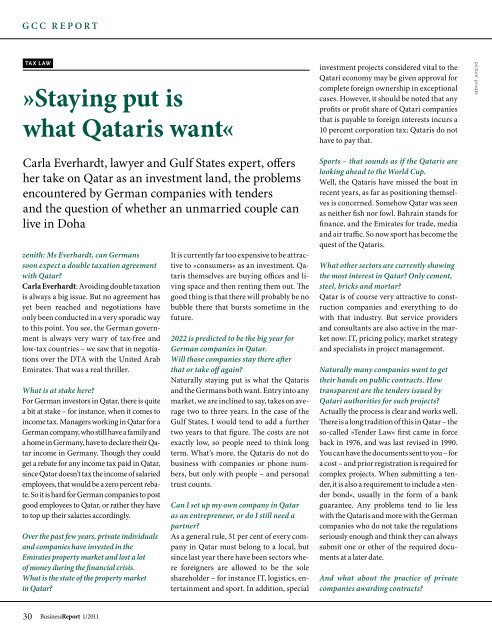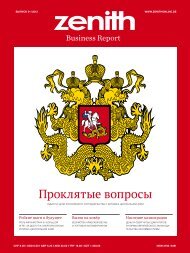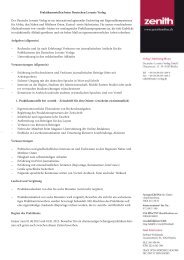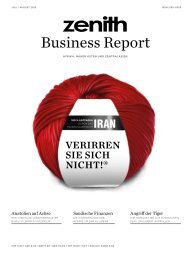You also want an ePaper? Increase the reach of your titles
YUMPU automatically turns print PDFs into web optimized ePapers that Google loves.
GCC REPORT<br />
TAx lAw<br />
»Staying put is<br />
what Qataris want«<br />
Carla Everhardt, lawyer and Gulf States expert, offers<br />
her take on Qatar as an investment land, the problems<br />
encountered by German companies with tenders<br />
and the question of whether an unmarried couple can<br />
live in Doha<br />
zenith: Ms Everhardt, can Germans<br />
soon expect a double taxation agreement<br />
with Qatar?<br />
Carla Everhardt: Avoiding double taxation<br />
is always a big issue. But no agreement has<br />
yet been reached and negotiations have<br />
only been conducted in a very sporadic way<br />
to this point. You see, the German government<br />
is always very wary of tax-free and<br />
low-tax countries – we saw that in negotiations<br />
over the DTA with the United Arab<br />
Emirates. That was a real thriller.<br />
What is at stake here?<br />
For German investors in Qatar, there is quite<br />
a bit at stake – for instance, when it comes to<br />
income tax. Managers working in Qatar for a<br />
German company, who still have a family and<br />
a home in Germany, have to declare their Qatar<br />
income in Germany. Though they could<br />
get a rebate for any income tax paid in Qatar,<br />
since Qatar doesn’t tax the income of salaried<br />
employees, that would be a zero percent rebate.<br />
So it is hard for German companies to post<br />
good employees to Qatar, or rather they have<br />
to top up their salaries accordingly.<br />
Over the past few years, private individuals<br />
and companies have invested in the<br />
Emirates property market and lost a lot<br />
of money during the financial crisis.<br />
What is the state of the property market<br />
in Qatar?<br />
30 BusinessReport 1/2011<br />
It is currently far too expensive to be attractive<br />
to »consumers« as an investment. Qataris<br />
themselves are buying offices and living<br />
space and then renting them out. The<br />
good thing is that there will probably be no<br />
bubble there that bursts sometime in the<br />
future.<br />
2022 is predicted to be the big year for<br />
German companies in Qatar.<br />
Will those companies stay there after<br />
that or take off again?<br />
Naturally staying put is what the Qataris<br />
and the Germans both want. Entry into any<br />
market, we are inclined to say, takes on average<br />
two to three years. In the case of the<br />
Gulf States, I would tend to add a further<br />
two years to that figure. The costs are not<br />
exactly low, so people need to think long<br />
term. What’s more, the Qataris do not do<br />
business with companies or phone numbers,<br />
but only with people – and personal<br />
trust counts.<br />
Can I set up my own company in Qatar<br />
as an entrepreneur, or do I still need a<br />
partner?<br />
As a general rule, 51 per cent of every company<br />
in Qatar must belong to a local, but<br />
since last year there have been sectors where<br />
foreigners are allowed to be the sole<br />
shareholder – for instance IT, logistics, entertainment<br />
and sport. In addition, special<br />
investment projects considered vital to the<br />
Qatari economy may be given approval for<br />
complete foreign ownership in exceptional<br />
cases. However, it should be noted that any<br />
profits or profit share of Qatari companies<br />
that is payable to foreign interests incurs a<br />
10 percent corporation tax; Qataris do not<br />
have to pay that.<br />
Sports – that sounds as if the Qataris are<br />
looking ahead to the World Cup.<br />
Well, the Qataris have missed the boat in<br />
recent years, as far as positioning themselves<br />
is concerned. Somehow Qatar was seen<br />
as neither fish nor fowl. Bahrain stands for<br />
finance, and the Emirates for trade, media<br />
and air traffic. So now sport has become the<br />
quest of the Qataris.<br />
What other sectors are currently showing<br />
the most interest in Qatar? Only cement,<br />
steel, bricks and mortar?<br />
Qatar is of course very attractive to construction<br />
companies and everything to do<br />
with that industry. But service providers<br />
and consultants are also active in the market<br />
now: IT, pricing policy, market strategy<br />
and specialists in project management.<br />
Naturally many companies want to get<br />
their hands on public contracts. How<br />
transparent are the tenders issued by<br />
Qatari authorities for such projects?<br />
Actually the process is clear and works well.<br />
There is a long tradition of this in Qatar – the<br />
so-called »Tender Law« first came in force<br />
back in 1976, and was last revised in 1990.<br />
You can have the documents sent to you – for<br />
a cost – and prior registration is required for<br />
complex projects. When submitting a tender,<br />
it is also a requirement to include a »tender<br />
bond«, usually in the form of a bank<br />
guarantee. Any problems tend to lie less<br />
with the Qataris and more with the German<br />
companies who do not take the regulations<br />
seriously enough and think they can always<br />
submit one or other of the required documents<br />
at a later date.<br />
And what about the practice of private<br />
companies awarding contracts?<br />
picture: private

















